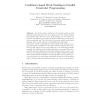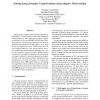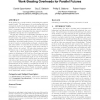59 search results - page 1 / 12 » Confidence-Based Work Stealing in Parallel Constraint Progra... |
203
Voted
CP
2009
Springer
16 years 2 months ago
2009
Springer
The most popular architecture for parallel search is work stealing: threads that have run out of work (nodes to be searched) steal from threads that still have work. Work stealing ...
108
click to vote
SPAA
2009
ACM
15 years 6 months ago
2009
ACM
Work stealing is a common technique used in the runtime schedulers of parallel languages such as Cilk and parallel libraries such as Intel Threading Building Blocks (TBB). Depth-r...
111
Voted
IPPS
1999
IEEE
15 years 6 months ago
1999
IEEE
Executing subordinate activities by pushing return addresses on the stack is the most e cient working mode for sequential programs. It is supported by all current processors, yet i...
123
Voted
ICPP
2008
IEEE
15 years 8 months ago
2008
IEEE
Solving large, irregular graph problems efficiently is challenging. Current software systems and commodity multiprocessors do not support fine-grained, irregular parallelism wel...
97
Voted
SPAA
2009
ACM
16 years 2 months ago
2009
ACM
Work stealing is a popular method of scheduling fine-grained parallel tasks. The performance of work stealing has been extensively studied, both theoretically and empirically, but...



